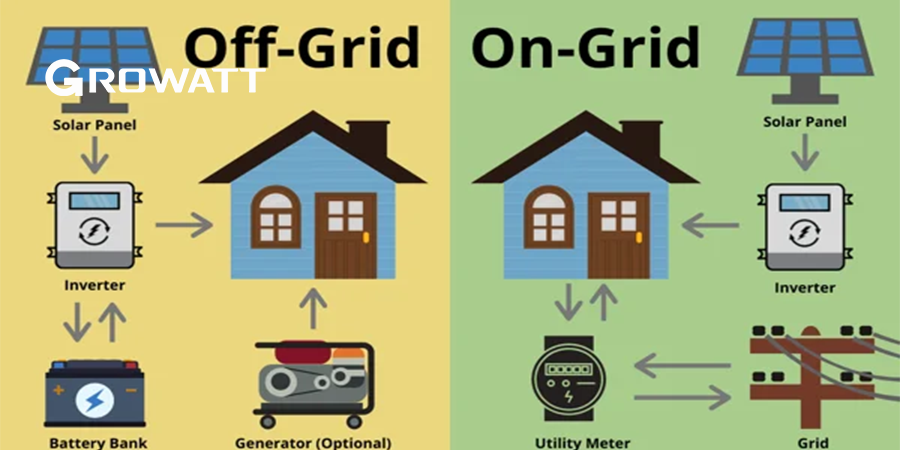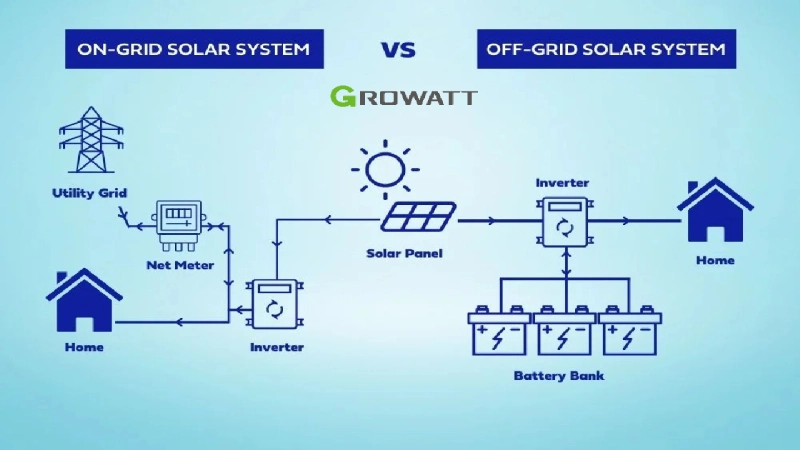As solar energy is becoming an inseparable part of our lives, it is becoming widespread. Today, solar panels are seen in every house as they have the potential to reduce carbon footprints and help save energy. In this manner, we have two central solar systems, the off-grid and the on-grid solar system. Today, householders choose the on-grid type of solar inverters, but the problem lies there: both on-grid and off-grid solar inverters are equally good and have great benefits. Sometimes, there needs to be clarity about whether we can run our house on the off-grid inverter type. The answer is yes; you can easily do so only if the home you have is solar-powered. If you desire to install the off-grid solar inverter, remember that it requires you to be familiar with the equipment. These inverters have advantages and disadvantages; we cannot say which is superior. When designing solar software, everything depends on location, energy consumption, and affordability. Off-grid inverters are always the best, but you can decide once you have read about the differences between these two types. Let us highlight the Difference between on-grid and off-grid inverter.
On-Grid Solar System
Let us read about what is on the grid solar system. The other name for the on-grid solar system is a grid-tied system. The on-grid type of solar system has a very reliable power source, and thanks to this, it supplies grid power and sometimes even feeds unused energy.
The on-grid type of solar system can provide a trustworthy source of electricity, and via it, one can take advantage of its net metering and save excess electricity bills. Check our site to get more information about Check our site to get more information about Growatt off-grid inverter price.
Off-Grid Solar System
On the other hand, the off-grid solar system is highly self-sufficient and connected to the electronic grid. This type of solar system is being used in far-off remote locations. The two types of solar systems have their unique advantages. Keep in mind that the off-grid solar system provides users with more independence when it comes to energy.
Are you aware of the components of a solar system? You should know that a solar system has simple principles. It is responsible for converting solar energy to direct current and can even be stored in the battery or converted into AC. You can use the AC for your household.
In the case of modern solar systems, they are also known as solar modules, which are built using silicon-based cells and generate direct currents. We have plenty of solar panel manufacturers today, but Growatt is the best. To get more details about growatt hybrid inverter price be in touch with our expert technicians.
What Is the Difference between on-grid and off-grid inverter? Which One Is Better?
In the following we are going to discuss the Difference between on-grid and off-grid inverter.
With off-grid solar energy, your solar system will produce electricity for you as long as the sun shines.
- When there is an excess production of electricity, the energy stored in the batteries will be accessed easily even when the solar is not producing any electricity.
- When the grid goes down, the off-grid solar system will work independently. All you need to do is connect the grid, and you will have access to the electricity.
- Last but not least, the electricity bills for the off-grid solar system are the best. You will not receive any electricity bill, but it can also be expensive because it requires other equipment such as batteries instead.
In the case of a grid solar system, you will have access to power until and unless the grid is down.
- Excess electricity production is the same in the case of on-grid solar and off-grid solar. You will be able to cover almost 100% of the energy usage.
- During the power down situations, you will not have electricity, which is the opposite of the off-grid solar. This is the only disadvantage over the off-grid solar.
- Last but not least, in the case of bills for the on-grid solar, a minimal charge is added to your electricity bill.
Based on the mentioned Difference between on-grid and off-grid inverter, you can choose which is better and ideal for you.
Advantages of On-Grid Solar Systems
Solar systems, irrespective of their type, have significant advantages as well. In the case of on-grid solar systems, the benefits are as follows:
- It is comparably more energy-independent
- Thanks to on-grid solar systems, you can save a lot of electricity bills.
- It can quickly neutralize the usage of your electricity.
- There are many applications for on-grid solar systems.
- It has easy and minimum maintenance.
- It is a renewable source of energy.
- Its unique design permits the user to use solar power first.
Advantages of Off-Grid Solar Systems
- Power remote location
- No Blackouts
- Energy independence
- Easier installation
- Suitable for rural areas
- Eco friendly
But now that we read about the Difference between on-grid and off-grid inverter and their advantages, which is better?
Which One Is Better: On-Grid Vs. Off-Grid Solar Systems?
Both these types have their particular benefits that make them unique. Looking at the benefits, one can understand which one is better than the other. On-grid and off-grid solar inverters are equally good, but the final choice depends on the buyer and the situation. You can contact our experts at Growatt and tell them your situation, and the experts will explain which type is ideal for your house. You can even enquire regarding the Growatt inventory for sale, and if you are interested in the off-grid investors, you should know that Growatt has the best. So, ask about Growatt’s off-grid inverter price, which will help you decide whether to buy it. We can harvest solar energy and generate electricity for home and commercial use as a one-stop shop with the latest merchandise in store. To buy growatt inverter, you can contact us through the contact numbers available on the site.






